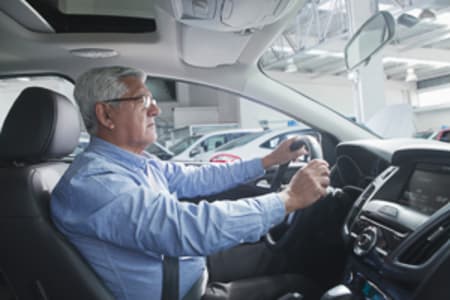Our Health Library information does not replace the advice of a doctor. Please be advised that this information is made available to assist our patients to learn more about their health. Our providers may not see and/or treat all topics found herein.
Topic Contents
Heart Rhythm Problems and Driving
Overview

Is it okay to drive if you have an arrhythmia?
You can drive with an arrhythmia as long as it doesn't cause symptoms that make it dangerous for you to drive. If you have an arrhythmia or an ICD (implantable cardioverter-defibrillator) that makes it dangerous for you to drive, your doctor might suggest that you stop driving, at least for a short time.
This information is about driving private vehicles. For commercial driving, the government has specific regulations about driving when you have certain medical conditions.
Your doctor might suggest that you not drive if you have symptoms like confusion, dizziness, lightheadedness, or loss of consciousness. If these symptoms happen when you are driving, you could cause an accident.
Limits on driving depend on many things. These include:
- Any symptoms you may have had, like fainting.
- The cause of your arrhythmia.
- The likelihood that your arrhythmia will happen again.
- If your arrhythmia has been treated successfully.
- If your ICD has given you a shock for an arrhythmia.
If your arrhythmia has made you pass out (lose consciousness), your doctor might recommend not driving until:
- The arrhythmia has been treated successfully.
- The arrhythmia has not happened again for a few months.
- The cause of the arrhythmia has been identified and corrected.
Arrhythmias that might restrict the ability to drive include:
- Ventricular fibrillation.
- Ventricular tachycardia.
- Supraventricular tachycardia.
- Bradycardia.
- Other reasons for fainting such as vasovagal syncope or carotid sinus sensitivity.
Is it okay to drive if you have an ICD?
If you get an ICD, you will not drive for a short time after you get the device implanted. Depending on the reason you got the ICD, you may not be able to drive for one week to a few months. If you get a shock from the ICD, your doctor may ask that you don't drive for a short time. Your doctor will let you know when you can drive again. Your doctor might follow these guidelines:
- If you get an ICD because you are at risk for a life-threatening arrhythmia (but have never had one), you will likely wait a few days after the implant procedure before driving again. This allows you time to heal. After you heal, you can drive again as long as your ICD has never given you a shock and you have no symptoms of an arrhythmia. But keep in mind that an arrhythmia could cause you to pass out (lose consciousness).
- If you get an ICD because you have already had a life-threatening arrhythmia, you might have to wait at least 6 months before you drive again.
- If you have an ICD that has given you a shock for an arrhythmia, you might have to wait at least 6 months before you drive again.
Is it okay to drive if you have a pacemaker?
You can drive if you have a pacemaker and you don't have any symptoms such as fainting. But right after you get a pacemaker, your doctor may ask you not to drive for at least several days after the device is implanted. This gives you time to heal.
Related Information
Credits
Current as of: July 31, 2024
Author: Ignite Healthwise, LLC Staff
Clinical Review Board
All Ignite Healthwise, LLC education is reviewed by a team that includes physicians, nurses, advanced practitioners, registered dieticians, and other healthcare professionals.
Current as of: July 31, 2024
Author: Ignite Healthwise, LLC Staff
Clinical Review Board
All Ignite Healthwise, LLC education is reviewed by a team that includes physicians, nurses, advanced practitioners, registered dieticians, and other healthcare professionals.
This information does not replace the advice of a doctor. Ignite Healthwise, LLC disclaims any warranty or liability for your use of this information. Your use of this information means that you agree to the Terms of Use and Privacy Policy. Learn how we develop our content.
To learn more about Ignite Healthwise, LLC, visit webmdignite.com.
© 2024-2025 Ignite Healthwise, LLC.




